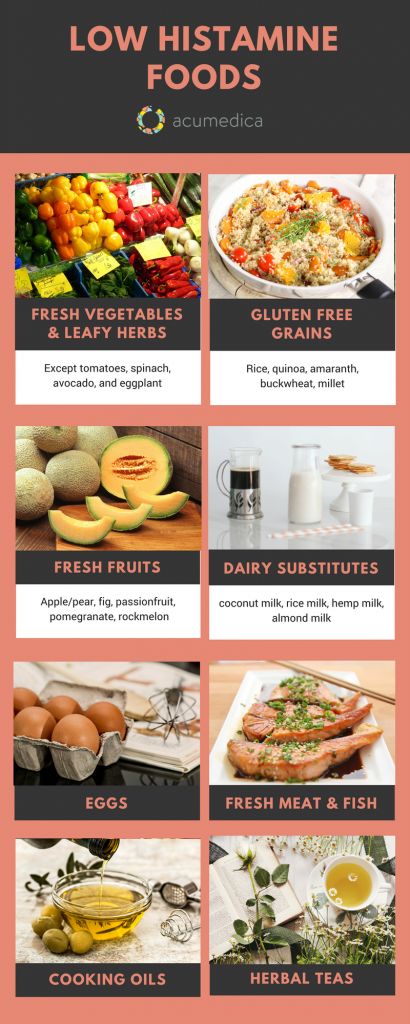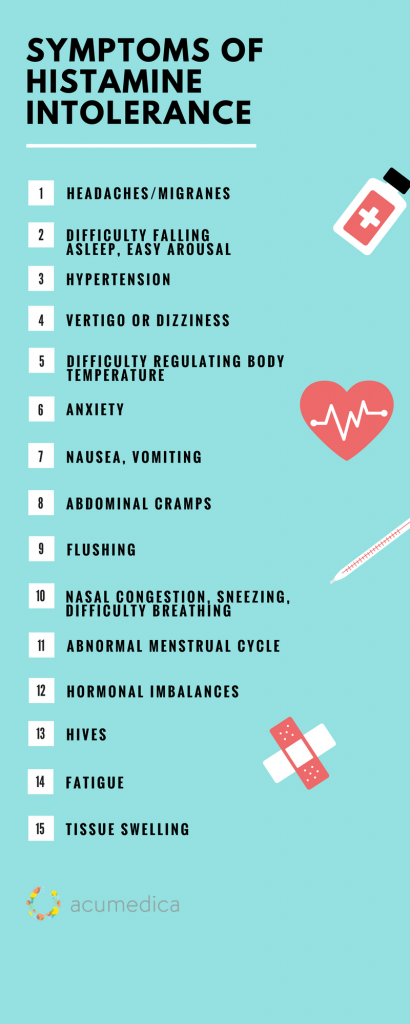You’ve probably heard of antihistamines. We use them when we are experiencing an allergic reaction. The role of antihistamines is to block a chemical released by the immune system called histamines, but exactly what are histamines?
Apart from its role in allergies, gastric acid secretion to assist with digestion and the inflammatory response histamine serves an important function as a neurotransmitter in the central nervous system. As a neurotransmitter, it communicates important messages from your body to your brain where it controls pituitary hormone secretion, arousal, wakefulness and cognitive functions.
Because it travels throughout your bloodstream, histamine can affect many body systems such as your gut, lungs, skin, brain, heart, circulation, reproductive organs, and hormone production therefore contributing to a wide range of problems often making it difficult to pinpoint and diagnose.
Foods and Histamines
If you have a food allergy, histamines are in on that response process, too. When you accidentally eat or drink something you shouldn’t, they’ll work in your gut to trigger your allergies. Thus, the importance of both food allergy and sensitivity testing.
Some foods are also naturally high in histamines. These include aged and fermented foods and alcohol (especially red wine). Some people may be sensitive to that.
Are you histamine intolerant?
Do you experience unexplained headaches, migraines or anxiety? What about irregular menstrual cycles? Does your face flush when you drink red wine? Do you get an itchy tongue or runny nose when you eat bananas, avocados, or eggplants? then you could have a histamine intolerance.
What Causes High Histamine Levels?
- Allergies (IgE reactions)
- Small Intestine Bacterial overgrowth (SIBO)
- Leaky gut (increased intestinal permeability)
- Gastrointestinal bleeding
- Fermented alcohol eg. wine, champagne, beer
- Diamine Oxidase (DAO) enzyme deficiency
- Histamine N-methyltransferase (HNMT) deficiency
- Histamine-rich foods
- Too much oestrogen
- Progesterone deficiency
Diet
In addition to the histamine produced inside your body, there are also a variety of foods that naturally contain histamine, cause the release of histamine, or block the enzyme that breaks down histamine, diamine oxidase.
Histamine-Rich Foods:
- Fermented alcoholic beverages, especially wine, champagne and beer
- Fermented foods: sauerkraut, vinegar, soy sauce, kefir, yogurt, kombucha, etc
- Vinegar-containing foods: pickles, mayonnaise, olives
- Cured meats: bacon, salami, pepperoni, luncheon meats and hot dogs
- Soured foods: sour cream, sour milk, buttermilk, soured bread, etc
- Dried fruit: apricots, prunes, dates, figs, raisins
- Most citrus fruits
- Aged cheese including goat cheese
- Nuts: walnuts, cashews, and peanuts
- Vegetables: avocados, eggplant, spinach, and tomatoes
- Smoked fish and certain species of fish: mackerel, tuna, anchovies, sardines
Histamine-Releasing Foods:
- Alcohol
- Bananas
- Chocolate
- Cow’s Milk
- Nuts
- Papaya
- Pineapple
- Shellfish
- Strawberries
- Tomatoes
- Wheat Germ
- Many artificial preservatives and dyes
DAO-Blocking Foods:
- Alcohol
- Energy drinks
- Black tea
- Mate tea
- Green tea
How do I break down histamine?
DAO (diamine oxidase) is the main enzyme responsible for breaking down ingested histamine. So if you’re deficient in DAO, you likely have symptoms of histamine intolerance.
Causes of Low DAO
- Gluten intolerance
- Leaky Gut
- SIBO
- DAO-blocking foods: alcohol, energy drinks, and tea
- Genetic mutations (common in people of Asian-descent)
- Inflammation from Crohn’s, ulcerative colitis, and inflammatory bowel disease.
- Medications:
- Non-steroidal anti-inflammatory drugs (ibuprofen, aspirin)
- Antidepressants (Effexor, Prozac, Zoloft)
- Immune modulators (Humira, Enbrel, Plaquenil)
- Anti-arrhythmics (propanolol, metaprolol, Cardizem, Norvasc)
- Antihistamines (Zyrtec)
- Histamine (H2) blockers (Zantac)
- Hormonal Imbalances
Although histamine blockers, a class of acid-reducing drugs, seem like they would help prevent histamine intolerance, these medications can actually deplete DAO levels in your body.
Elimination/Reintroduction
Remove the above high histamine foods for 30 days and reintroduce them one at a time to identify your triggers. You may not have to avoid the foods forever but it can be a solution until your histamine or DAO levels return to their optimal levels.
Testing for Histamine
Consider having whole blood histamine and DAO tested along with other cofactors that can increase or affect the breakdown of histamine in your body.
Food Sensitivity testing will pin point the exact foods that are causing the allergic response thereby reducing allergy symptoms and inflammation in your body.
Acupuncture shown to be effective at treating Allergies
A systematic review of 13 randomized controlled trials concluded that acupuncture could be a safe and valid treatment option for allergic rhinitis. Whilst the Clinical practice guidelines for allergic rhinitis published by the Otolaryngology Head Neck Surgery Foundation in 2015, recommended that clinicians may refer to a clinician who can offer acupuncture, for patients with allergies who are interested in non-pharmacological therapy as a safe and effective treatment.
Foods to eat

Sample diet
Breakfast: Millet porridge with poached pear and seeds
Lunch: Salad of red cabbage, celery, green beans, brown lentils, chopped parsley and olive oil
Snack: Celery sticks with tahini
Dinner: Steamed fish with garlic, rice and steamed vegetables
References
1 .McDondald and Janz 2017, The Acupuncture Evidence Project: A Comparative Literature Review
2. Nuutinen, S and Panula, P 2010, Histamine in neurotransmission and brain diseases. Adv Exp Med Biol. Vol. 709:95-107.

